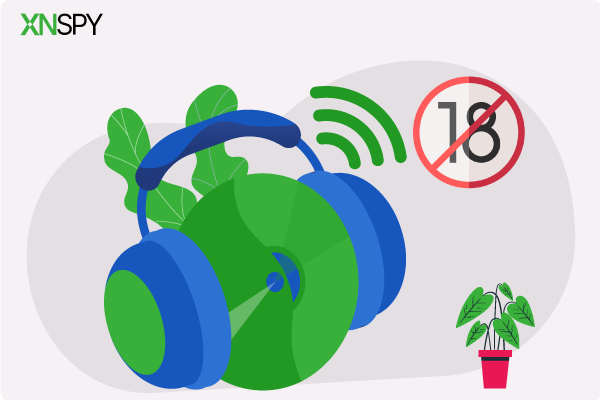The complete monitoring experience for your phone
Get XNSPY and start tracking calls, texts, multimedia, locations and more on any phone!
Get Started Now Live DemoMay is celebrated as Mental Health Month, and it is more important than ever to discuss the social and emotional difficulties our children are experiencing. For several decades, discussing mental issues was taboo and people suffered in silence to avoid the embarrassment.
Today, Gen Z and Alpha kids are more open to talking about their stress, anxiety, and depression. However, the stigma still exists and some kids have the fear of being stereotyped and judged.
Mental Health Month aims to normalize the discussion surrounding mental challenges among kids. The emphasis is on awareness and making the teens realize that seeking help is a sign of strength, not weakness.
Why is a Child’s Mental Health Important?
For many people, ‘’good health’’ only means physical fitness but mental and emotional well-being are equally important.
Physical health shows how strong the kid is and how fast they can recover from an illness or injury. While, mental health shows how a child thinks, behaves, and copes with various emotional, physical, and mental changes. According to a recent survey by Statista, 87% of youth experience mental health problems regularly.
A mental disorder causes delays and disruptions in the child’s thinking, social skills, and behavior. Consequently, these disruptions impact the child’s ability to function adequately at home, school, and social situations.
Signs of Mental Health Problems in Children
Not one but multiple factors impact mental health in children. However, the more risk factors the teens are exposed to, the more impact on their psychological well-being. Major factors include exposure to hardships, identity crises, and pressure to fit in social circles. Moreover, societal norms and social media influence intensify the difference between the teen’s existing reality and their perception of the future.
Mental health issues are increasing among teens and children. However, as children grow faster, it can be difficult to say if they are anxious out of instinct or due to any underlying factors. Parents, therefore, need to be watchful of all obvious and subtle changes in their child’s life.
Anxiety and Depression
It’s no surprise that academic pressure, social media, and even the responsibility of daily chores can cause anxiety and depression in most adolescents. While certain stress and anxiety are part of everyday life, increasing instances can surely take a toll on the child’s mental health.
Declining School Performance
Falling school grades is another telling sign that the child is undergoing emotional and psychological stress. One or more factors can impact the child’s focus, intellectual ability, and energy level and hinder the optimum performance necessary to excel at school.
In some extreme cases, older teens may even drop out of school. Also, last year’s Gallup survey states that Gen Z kids may struggle more and have distinct mental health problems as compared to millennials.
Behavioral Changes
Parents know their children better than anyone and can easily notice the stark difference in their mood and other aspects like eating and sleeping patterns. If your child suddenly withdraws from social gatherings, develops signs that might indicate digital addictions, is disinterested in their favorite activities, and has moments of outbursts, then something is not right.
How to Talk About Mental Health to Your Child
Once you recognize the signs, discussing them with your child is significant. Some parents may be apprehensive about how the child may react. However, discussing the child’s mental well-being is as important as when they have any illness or injury. The way you approach the situation will define the child’s perception of mental health for years to come.
Here is what you need to do
Choose the Right Time
It is crucial to pick the right time for the conversation. Experts say to choose a time when both the parent and child are calm, and there is no rush of emotions or have to go somewhere. Apart from the time, the setting also matters. Pick a weekend and take the child for a walk, fishing, or talking in the evening after dinner. The purpose is to make the child comfortable and at ease.
Listen without Judging
When discussing sensitive topics with children, it is better to understand them from their perspective. Yes, you may have more knowledge and experience, but for the children, it may be their first time going through stress or depression.
Let the children talk and complete what they are explaining. It is all about giving the child confidence to open up rather than speculating and making assumptions.
Acknowledging the Child’s Feeling
Children are quite truthful, whether they express excitement by discussing their favorite hobby or talking about getting a new gadget as a gift. Similarly, the child’s emotions while discussing their struggles are also true.
You need to acknowledge and realize that what the child is saying is real. The child will also know that you respect and support them, and they will be eager to manage their stress.
5 Ways to Monitor and Manage a Child’s Mental Health
Children undergo drastic changes in their teens, which can be an emotional rollercoaster for many. Only timely parental love and support can help the child overcome teenage challenges. There are many ways that can help the child pull through the stressful experiences and manage their mental health.
Let us explore the best solutions.
1. Fostering a Loving Home
Children spend most of their time at home, and the environment shapes their present and future lives. A supportive and loving home is the best solution for almost all the mental issues a child experiences. Ensure that the living space is one where mistakes are accepted, and children are acknowledged for their sincere efforts. Everyone must follow the rules, and concerns must be understood and not ignored.
2. Promoting Healthy Habits
Children will be resilient only if they eagerly follow healthy habits, such as a balanced diet, regular exercise, and sufficient rest. Take time from your busy schedules to take your kids on trips, sporting activities, and anything that makes them appreciate the world around them.
3. Reduce Screen Time
A study states that children who spend less time in front of digital screens have better mental health. Gen Z and Alpha kids are growing amid technology, which helps them keep pace with modern trends.
However, excessive screen time is directly linked to negative outcomes in children that include lack of concentration, irregular sleep, obesity, stress, and risk of chronic illness in the future. Depending on the child’s age, make a rule that the child should not have more than 2 to 3 hours of screen time.
4. Use a Parental Monitoring App
You can set house rules regarding screen time and internet usage, but kids can easily break them. While parental control is available on most of the apps children use, they have limited features that children can easily evade. You need the XNSPY monitoring app that gives you a holistic view of the child’s digital footprint.
The app discreetly collects the child’s cell phone data and uploads it to the dashboard. You can remotely monitor their social media interactions on apps such as Facebook, Instagram, Snapchat, and others and identify any instances of cyberbullying. XNSPY’s screentime feature lists installed apps and the time spent on each app.
Furthermore, the keylogging tool tracks each keystroke the child makes. You can complement it with the watchlist alert feature of XNSPY and get instant notifications about your child’s online activity, even with a busy routine.
5. Seek Professional Help
Every parent wishes that their child’s mental struggles could be solved easily without elaborate treatments. Seeking help from expert and trained psychologists is always a tough call to make, but in some cases, it is the right choice.
The child may be overwhelmed by growing stress and anxiety, and a psychologist can help resolve them. The treatment involves therapy and counseling to help the child relax and cope with behavioral changes.
Conclusion
Adolescence is a tricky phase in every teen’s life. Teenagers are full of energy and want to make their own rules and decisions. When faced with a complex situation or stress, most will try to keep silent or solve it alone without their parent’s knowledge. It is the reason why mental illness in children is rising worldwide. Screen time is a mere distraction and worsens the situation.
Mental Health Month is essential to raising awareness, ensuring support for children, and empowering them to rally through their mental struggles. As a parent, you must be proactive and notice the stark signs and symptoms.
Ensure a loving environment at home, have an open conversation with the child, and seek professional help. Install a parental monitoring app to monitor the child’s digital usage and shield them from the myriad online threats that can amplify stress and anxiety. With the best tools and support, you can help the child efficiently manage mental health issues.


